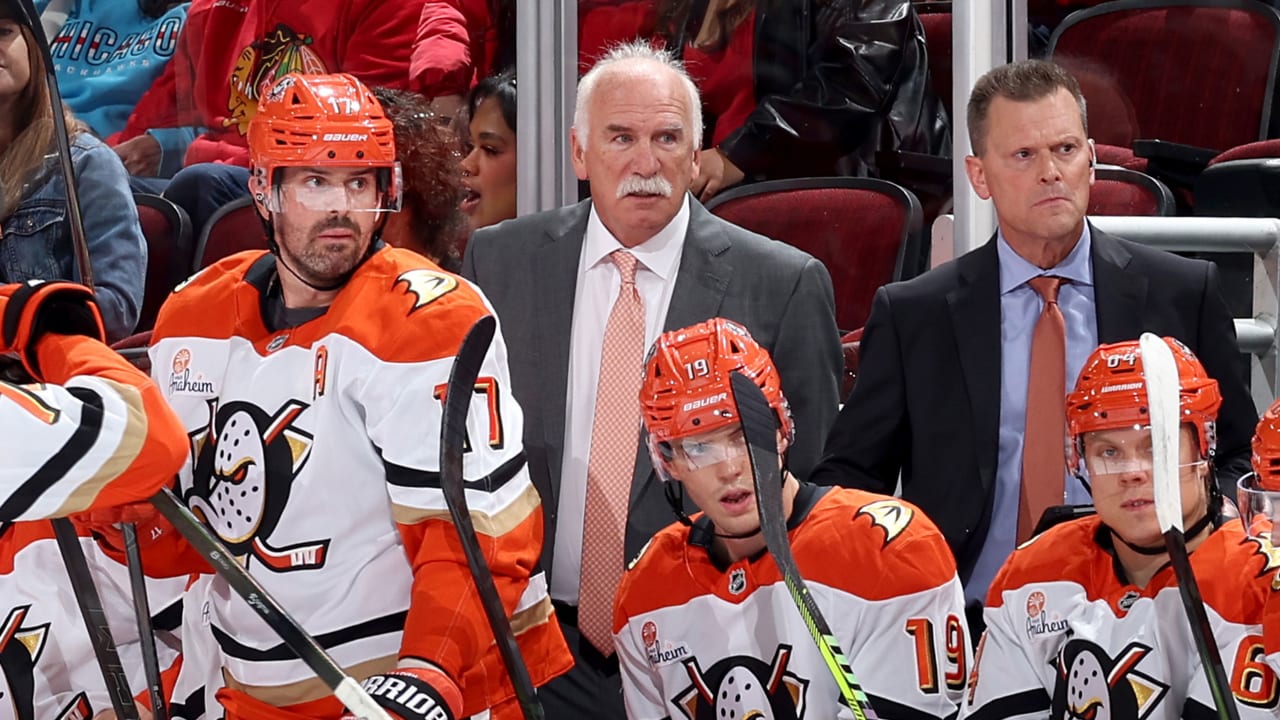The Ducks, who won the Stanley Cup in 2007 and were Pacific Division champions for five straight seasons from 2012-17, haven’t qualified for the Stanley Cup Playoffs for seven straight seasons.
But similar to the Blackhawks, who had players like Toews, Kane and defensemen Brent Seabrook and Duncan Keith that led them back to prominence, the Ducks have a young core that is ready to take the next step. That core includes forwards Beckett Sennecke, 19; Leo Carlsson, 20; and Cutter Gauthier, 21; and defensemen Olen Zellweger, 22; and Pavel Mintyukov, 21.
“I think the whole group here coming into the season had that type of a feeling around themselves, the older guys knowing their existence here is like, it’s time for them,” Quenneville said. “The younger guys, we want to give these guys more responsibility as far as taking some ownership in the leadership department. We’ve given them some captaincies in that regard, included them a little bit more.
“The opportunity for these guys to take that next step has definitely been witnessed by us already. So, that’s been a good sign.”
Carlsson and defenseman Jackson LaCombe, 24, are among those who have been an alternate captain in games this season.
“It’s been all positive,” LaCombe said after Sunday’s game. “[Quenneville] brings a lot of energy. He has so much experience that we can learn from and grow from. He’s been great for all of us. We have to give the same effort back.
“I think our whole team is (taking steps). We’re determined to win. Some of these games we just have to come out a little faster, a little sharper and we’ll get better results.”
Kane, who now plays for the Detroit Red Wings, said Quenneville can turn things around in Anaheim.
“The thing about him is, he makes the game simple, right? So, you’re not thinking too much, and I think sometimes that’s maybe the problem in our League a little bit,” he said. “Those guys will be able to play with freedom, they’ll be able to play with, you know, a lot of excitement and flair if they want, as long as they’re doing the right things, right? I think he’ll do a good job there.”
Quenneville probably won’t be shy in moving players around the lineup, using them in situations that may be different for them. In Chicago, he put forward Andrew Shaw, a fifth-round pick (No. 139) by the Blackhawks in the 2011 NHL Draft, on the first power-play unit. Marcus Kruger and Michael Frolik were thrown onto the penalty kill and became two of the Blackhawks’ best in that department.
Patrick Sharp, who was predominantly a left winger, played a big role during the Blackhawks’ 2010 Cup run as a center.
“He seemed to really put players in spots where their attributes could shine through,” Sharp said. “There was no perfect player on our team — well, there were a couple who were pretty close — but the players who had flaws in their game, Joel was there to kind of protect those players, help them get better, put them in positions to help the team in what they could do best.”
As the Ducks adapt to Quenneville, he’ll have to adapt to an NHL game that’s changed during his four-year absence. To that end, Quenneville has leaned on his assistants Jay Woodcroft, Ryan McGill, Andrew Brewer and Tim Army. Woodcroft was most recently the coach of the Edmonton Oilers for parts of three seasons from 2022-23, and McGill was an assistant for the New Jersey Devils from 2022-25. Army is entering his second season as a Ducks assistant, and Brewer most recently was an assistant with Utica of the American Hockey League in 2022-23.
“All new guys for me, giving me all kinds of different ideas, whether it’s our special team coaches, face-off guys. I mean, running practices, it’s a whole different bag of tricks,” Quenneville said. “For a guy that’s been away, it’s really been beneficial looking at it through a different lens, doing some things differently.”
For the Ducks, the time is now. They’ve been working through their rebuild for a few years, and they need to get back to their past success. Quenneville has done it before, and he is certainly looking to do it again.
“Getting back behind the bench is the fun part about the game,” Quenneville said. “I think we can get better in how we want to play and more consistent systematically in how we want to move around the ice, but we’re a young team, and it’s probably a change to how they’re accustomed to playing.
“I’m excited because I think it’s a competitive group that wants to get better and won’t be satisfied and take things for granted.”
NHL.com columnist Nicholas J. Cotsonika contributed to this report

